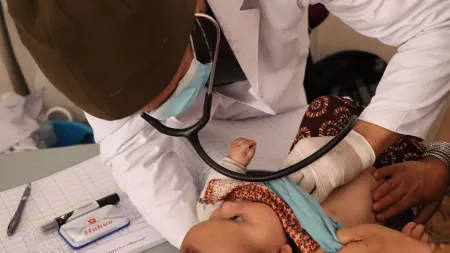"I am eight months pregnant, but this is the first time I'm seeing a doctor," says Belqees*, in her early thirties, at a CARE mobile health clinic in Balkh province, in the north of Afghanistan. Like many women, Belqees either lives too far from a public hospital or cannot afford the transportation costs, and the cost of attending a private clinic leave that option out of reach. Around 80 to 100 patients attend the weekly mobile health clinic in this remote village, most of whom would otherwise not be able to access the medical care they need.
Along with a doctor, CARE’s mobile clinics have a midwife, vaccinator, nutrition counsellor, and a psychosocial worker.
Jamila, 28*, says, "My husband is a day laborer, but he hasn’t found work since the beginning of winter. He had a motorcycle accident and has had mental health problems since then. On rare cases, our neighbors help us with bread and flour. When I can, I wash clothes for them to earn money to feed my children, despite it being painful due to an arm injury I have. I haven't seen a doctor about my arm because I can't afford the treatment. I have two children, Shahnaz, 3, and Razia, 2, and they have both suffered from malnutrition since they were born. We haven’t been able to take care of them properly because we can't afford it. Since CARE started helping us with nutrition packages, my children’s health condition has improved. If CARE hadn’t helped us, their health would have kept getting worse."
In a mountainous village of 4,000 houses in Kabul province, CARE is the only organization that provides health services including medicines, maternal health and nutrition services to residents, in particular to women and girls, through its weekly mobile health clinics. Unemployment, poverty, lack of schools and mental health issues are the main challenges in the area.
Dr. Shamsur Rahman* a CARE doctor said, "Each time I come here, I see between 100 and 150 patients in a day. Flu, cough, and other winter-related diseases, like lung problems, and diarrhea, are the most common problems in this village. Women and children are the most vulnerable and are in dire need. There are no physical health centers here. CARE is the only organization that provides health services for this community. We also provide free medicine, whereas in public health centers, medication must be paid for, and often, people simply cannot afford it."
Over the past 6 months CARE Afghanistan has supported 61,592 people with health services, of which 65% are women and girls in Ghazni, Herat, Balkh, Kabul and Khost provinces. The services include primary health care, maternal health, nutrition support, referrals to specialized facilities for gender-based violence cases, COVID awareness-raising and psychosocial support services. In addition, CARE has distributed emergency medicines, medical supplies and equipment to health facilities.
Since the change in power in August 2021, medicine and equipment shortages, and unpaid salaries for health workers, have put enormous additional strain on an already weak health system. An estimated six million people have no access, or insufficient access, to health care in Afghanistan, and women and children pay the heaviest price. Ahead of the 31 March Afghanistan donor pledging conference, CARE is urging the international community to step-up their commitment to support the most vulnerable people in Afghanistan to access critical health services.
